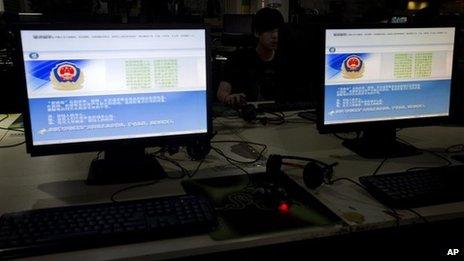China issues new internet rules that include jail time
- Published

People will be charged if their "online rumours" are visited by 5,000 users
Chinese officials have issued new guidelines that could see internet users jailed for writing posts that spread rumours online, state media say.
Internet users who make defamatory comments which are visited by 5,000 users or reposted more than 500 times could face up to three years in prison.
Anyone who posts information that leads to protests or ethnic unrest could also face prosecution.
These rules appear part of an official campaign to stop "online rumours".
The document detailing the new guidelines was released by the country's highest court and its top prosecuting body on Monday.
Other guidelines cover posts that cause suicide or self-mutilation, as well as extortion and provoking online arguments, according to reports.
The maximum sentence for defamation in China is three years, according to Xinhua news agency.
A court spokesman was quoted by Reuters news agency as saying that society was "demanding with one voice serious punishment by the law for criminal activities like using the internet to spread rumours and defame people".
"No country would consider the slander of other people as 'freedom of speech'," the spokesman added.
The new guidelines are clearly a way to crack down or control general online views, analysts say.
This comes as internet users have increasingly pursued those perceived as having done wrong, including government officials, through online exposes and campaigns.
In recent weeks, there have been signs that this has worried the authorities, with a number of journalists arrested for "rumour-mongering" and a high-profile blogger arrested.
Last month, a high-profile Chinese-American blogger was detained by Beijing authorities for allegedly hiring prostitutes for "sex parties".
In a separate case, four people were also arrested over posts made on Chinese social media forum weibo. The users were said to have "incited dissatisfaction with the government" by spreading rumours about a "hero" used in various propaganda posters.
- Published21 August 2013
- Published17 May 2013
- Published27 March 2013
- Published1 August 2012
- Published16 December 2011